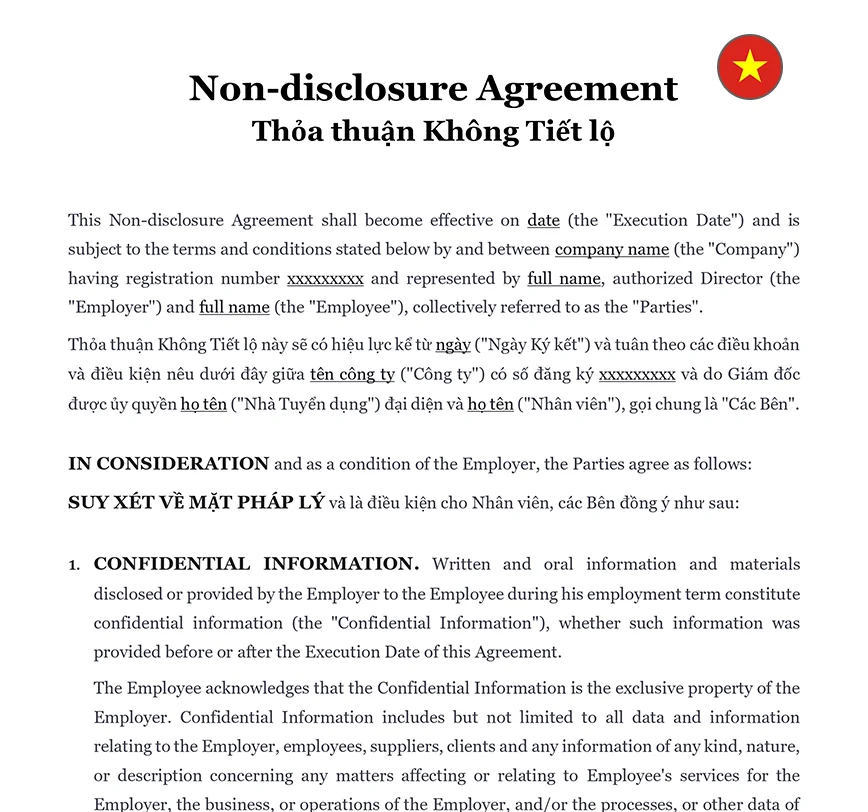Ready to use legal template
Drafted by experienced lawyers
Vietnamese-English translation
Ready to use legal template
Drafted by lawyers
Vietnamese-English translation
Learn more about Employee Confidentiality Agreement in Vietnam
Our Employee Confidentiality Agreement is a crucial instrument for safeguarding your company’s confidential information. This agreement, professionally crafted by our expert legal team, serves to underscore the significance of confidentiality in your organization. It ensures that your employees understand their responsibility to maintain the confidentiality of sensitive information and outlines the consequences of any breaches. Our document is meticulously drafted to comply with Vietnamese laws and is conveniently provided in a user-friendly Word format, allowing for easy customization to meet your specific business needs. Trust Themis Partner to provide you with the legal tools necessary to protect your valuable information and secure your business interests.
Table of contents
What is an Employee Confidentiality Agreement?
What is included in an Employee Confidentiality Agreement?
Why is it important in Vietnam?
Who can use an Employee Confidentiality Agreement?
Are there any specific requirements for drafting it in Vietnam?
How should an employer handle disputes in Vietnam?
How can an employer ensure that employees understand the terms?
Can an Employee Confidentiality Agreement be used to protect customer information?
What is an Employee Confidentiality Agreement?
An Employee Confidentiality Agreement, also known as a confidentiality or nondisclosure agreement (NDA), is a crucial legal document used to protect sensitive information within a business. This agreement establishes a confidential relationship between the employer and the employee, ensuring that any proprietary information, trade secrets, or other confidential materials shared with the employee remain protected from unauthorized disclosure. By signing this agreement, employees acknowledge their responsibility to maintain the confidentiality of such information both during and after their employment.
The Employee Confidentiality Agreement typically outlines the types of information considered confidential, the duration of the agreement, and the consequences of breaching the agreement. It may also include provisions regarding the return or destruction of confidential information upon the termination of employment. This agreement is essential for businesses looking to protect their intellectual property, maintain a competitive advantage, and ensure that their confidential information remains secure.
What is included in an Employee Confidentiality Agreement?
An Employee Confidentiality Agreement typically includes several key components:
Definition of Confidential Information: This section defines what information is considered confidential and protected by the agreement. It can include trade secrets, business plans, financial information, customer lists, and other proprietary information.
Scope of the Agreement: This part specifies the duration of the agreement and the circumstances under which the employee is obligated to maintain confidentiality, both during and after employment.
Employee Obligations: This section outlines the employee’s responsibilities regarding confidential information, including the duty to keep it confidential, not to disclose it to unauthorized parties, and to use it only for authorized purposes.
Exceptions: Some agreements include exceptions that allow the employee to disclose confidential information in certain circumstances, such as when required by law or court order.
Consequences of Breach: This part explains the consequences of breaching the agreement, which can include legal action, termination of employment, and other remedies.
Return or Destruction of Information: Many agreements require employees to return or destroy confidential information upon termination of employment.
Why is it important in Vietnam?
An Employee Confidentiality Agreement is important in Vietnam for several reasons:
1. Protecting Trade Secrets: In a competitive business environment, companies need to protect their trade secrets and proprietary information. An Employee Confidentiality Agreement helps prevent employees from disclosing such information to competitors or the public.
2. Maintaining Competitive Advantage: By ensuring that confidential information remains confidential, businesses can maintain their competitive advantage in the market. This is especially crucial in industries where innovation and unique processes are key drivers of success.
3. Complying with Legal Requirements: Vietnamese law recognizes the importance of protecting confidential information. Having an Employee Confidentiality Agreement in place can help businesses comply with legal requirements related to confidentiality.
4. Safeguarding Customer Information: Businesses often deal with sensitive customer information. An Employee Confidentiality Agreement helps ensure that this information is protected from unauthorized disclosure.
5. Preserving Relationships: Confidentiality breaches can damage relationships with clients, partners, and stakeholders. An Employee Confidentiality Agreement helps preserve these relationships by ensuring that sensitive information is kept confidential.
Who can use an Employee Confidentiality Agreement?
Here is a list of entities that can use an Employee Confidentiality Agreement:
| ➤ Businesses (small, medium, and large) |
| ➤ Startups |
| ➤ Corporations |
| ➤ Non-profit organizations |
| ➤ Government agencies |
| ➤ Educational institutions |
| ➤ Research institutions |
| ➤ Consulting firms |
| ➤ Healthcare organizations |
| ➤ Technology companies |
| ➤ Financial institutions |
| ➤ Legal firm |
| ➤ Manufacturing companies |
| ➤ Retailers |
| ➤ Service providers |




